Seed Grant Program Advances Energy Innovation Through a National Security Lens
Jul 22, 2025 — Atlanta, GA
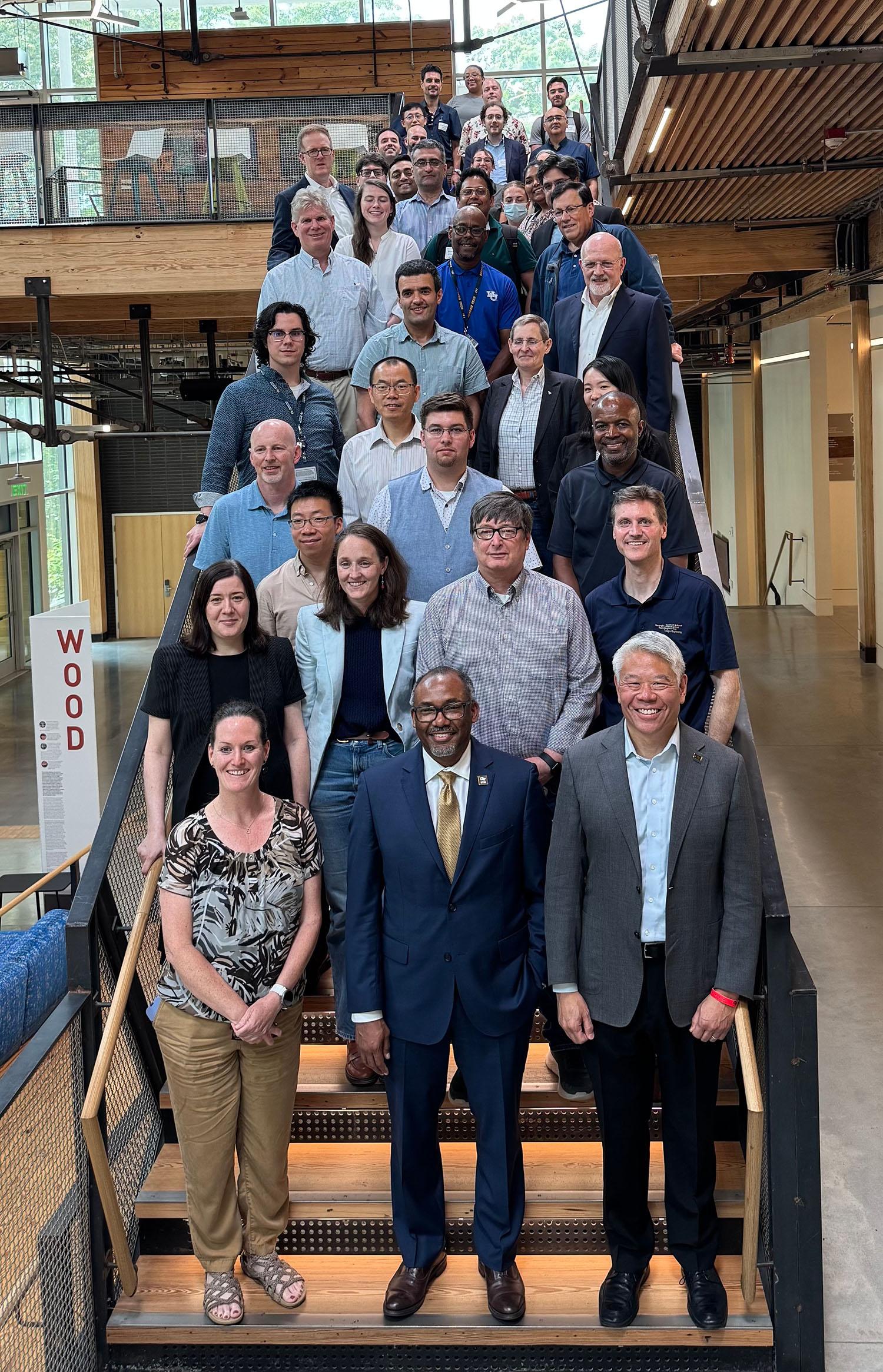
Attendees of the Energy and National Security Cohort Meeting, featuring seed grant teams along with members from SEI and GTRI
In June, the Strategic Energy Institute (SEI) hosted the Energy and National Security Summer Cohort Meeting that convened seed grant awardees from the Energy and National Security Initiative. A partnership between SEI and the Georgia Tech Research Institute (GTRI), the initiative provides research support through a seed grant program that launched last summer.
“As national security needs rapidly evolve, Georgia Tech is leveraging its research ecosystem and seed funding programs to accelerate the development of transformational technologies and strategies that strengthen national resilience,” said Christine Conwell, interim executive director of SEI. “We designed this seed grant program to tackle pressing national security priorities of today, such as threats to the grid, nuclear security, supply chain resilience, and renewable integration.”
The event began with an introduction from John Tien, SEI distinguished external fellow, professor of the practice, and former deputy secretary for the Department of Homeland Security, who addressed the evolving and multifaceted challenges facing energy, national security, and policy today. Tien’s talk emphasized the importance of early, strategic research investments in driving sustainable progress and long-term solutions.
The seed grant awardees then presented the initial progress of their research projects through lightning talks and a Q&A session. The research projects included:
- Energy Infrastructure Security and Risk Assessment Through Interactive Wargaming.
- Evaluating Energy Storage Materials, Supplies, and Systems in the Context of National Security Requirements.
- Nanostructured Sensors for Monitoring of Nuclear Fuel Cycle.
- Resilient Critical Infrastructures via Provable Secure Control Algorithms.
- Robust Energy Systems Planning by Way of Novel Systems Engineering (RESPoNSE).
- SPARC: Severe-Weather Predictive Analytics and Resilient Communication.
- The Strategic Mineral Economy: Challenges and Opportunities for Critical Resources.
“That critical intersection between energy and national security is where both risk and opportunity lie. To mitigate those risks and take advantage of the opportunities, our project teams have developed research topic areas that align with the U.S. Department of Energy's nine pillars for American energy dominance and security, as well as ongoing U.S. Department of Defense priorities,” said Tien.
The meeting showcased Georgia Tech’s collaborative and forward-looking research at the intersection of energy and national security, aimed at shaping a more secure and resilient energy future.
Written by: Katie Strickland
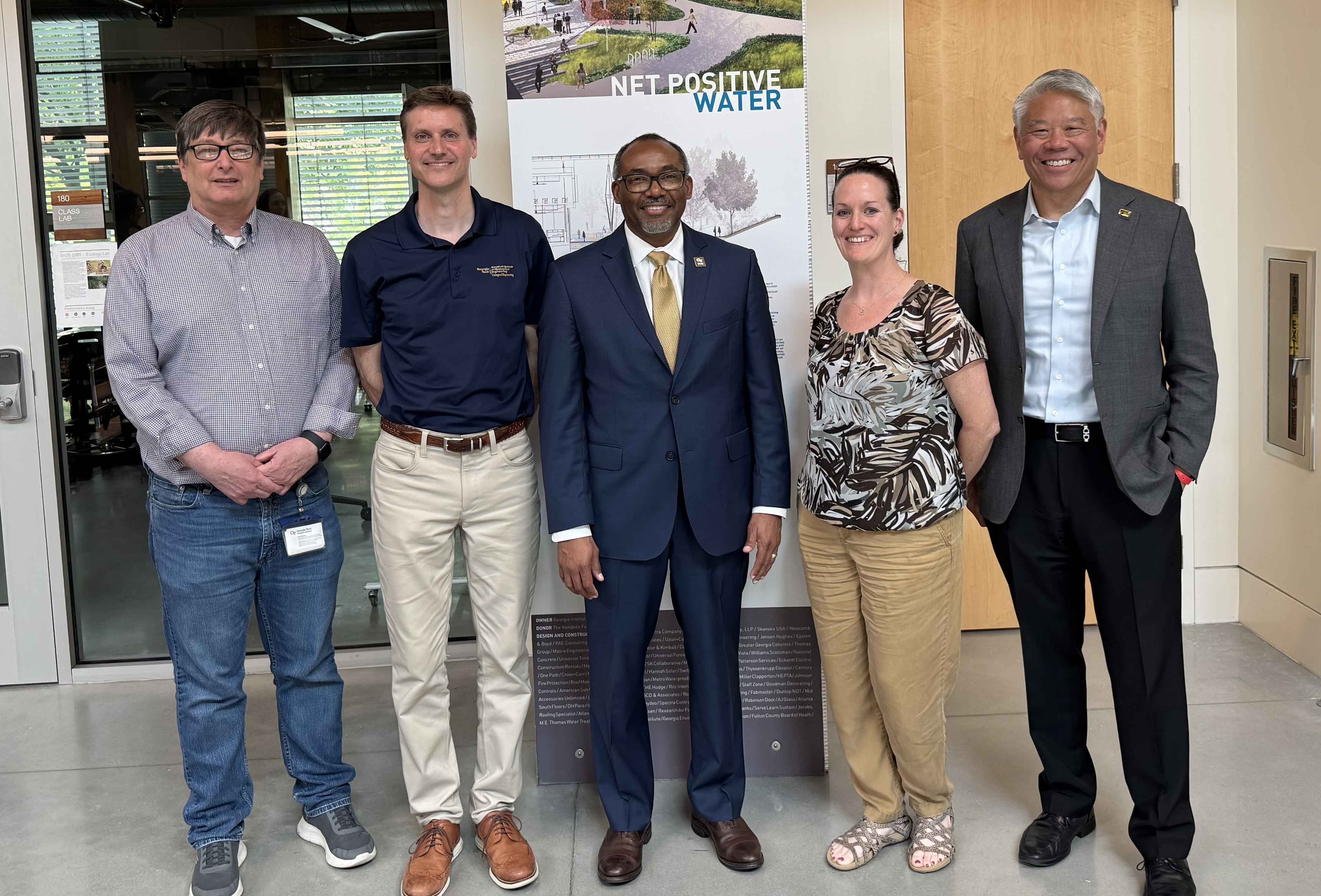
Gary McMurray, GTRI Division Chief for Intelligent Sustainable Technologies Division, Rich Simmons, SEI Director of Research and Studies, William H. Robinson, GTRI Deputy Director of Research and Interim CTO, Christine Conwell, SEI Interim Executive Director, and John Tien, SEI Distinguished External Fellow at the Energy and National Security Cohort Meeting
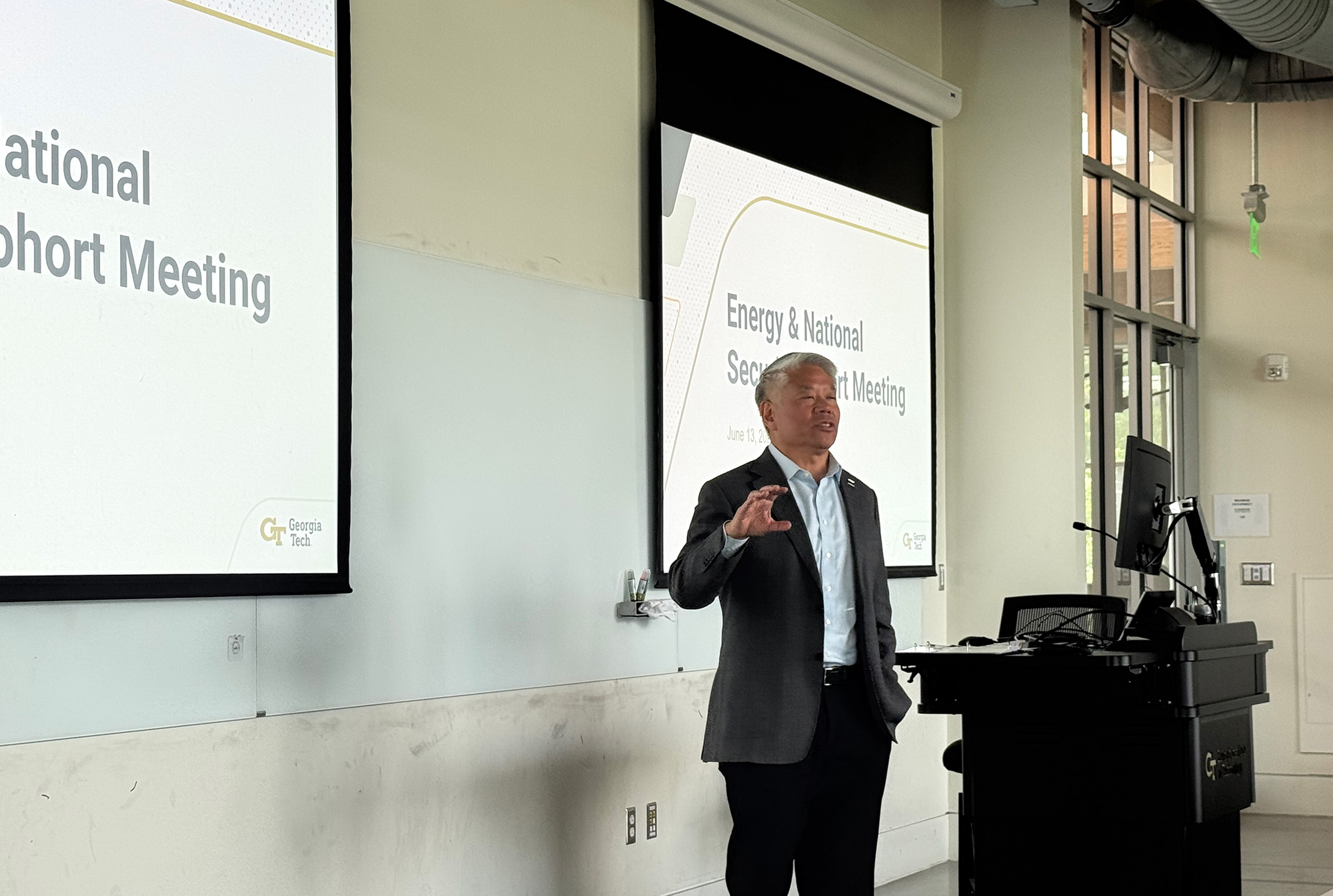
John Tien, SEI Distinguished External Fellow sharing remarks at the meeting.
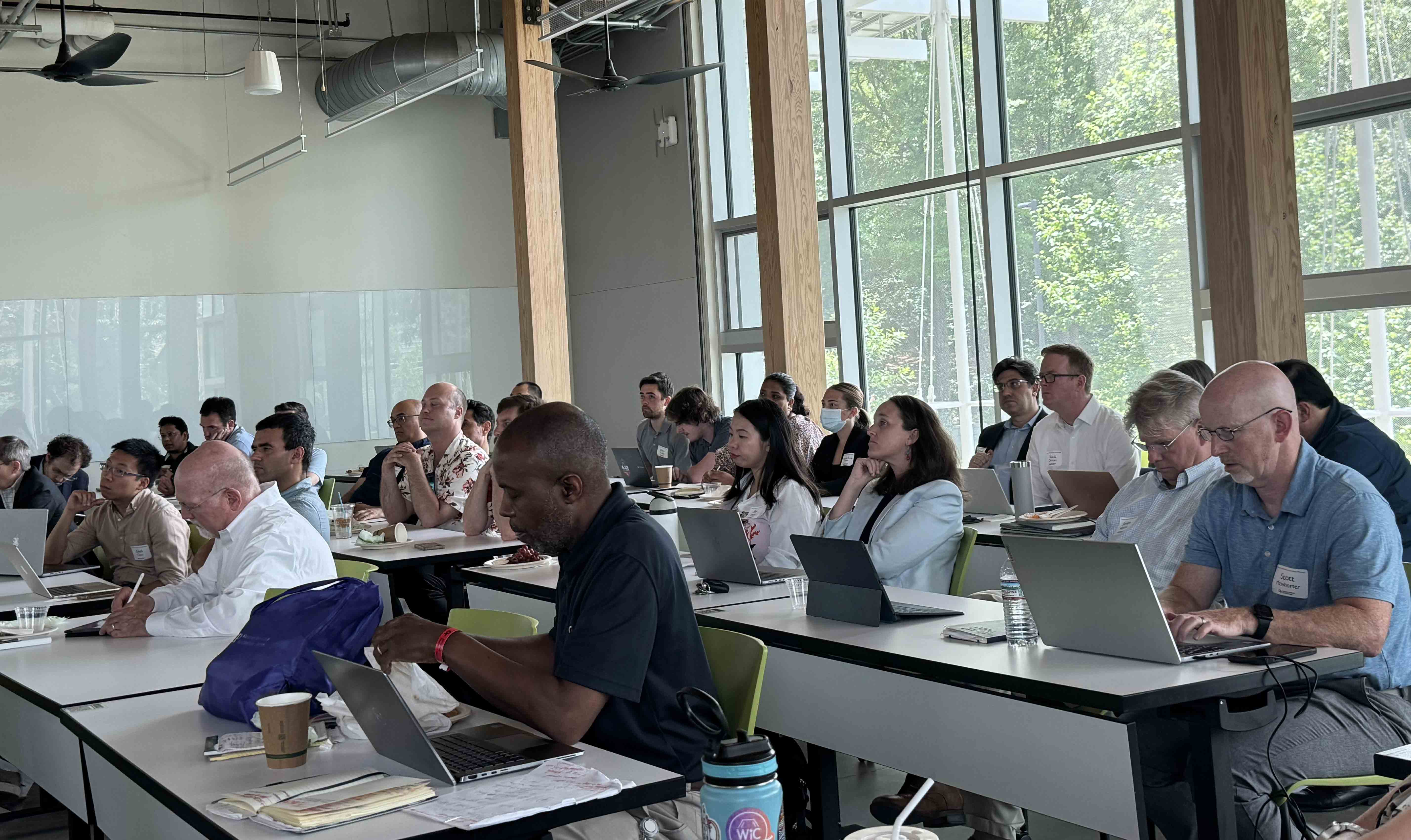
Participants of the June 13 Energy and National Security Cohort Meeting hosted by SEI and GTRI
Priya Devarajan || SEI Communications Program Manager
Fueling Young Minds: Georgia Tech Summer Campers Explore Energy Systems With Oglethorpe Power, Green Power EMC, and Georgia System Operations Corporation
Jul 10, 2025 — Atlanta, GA
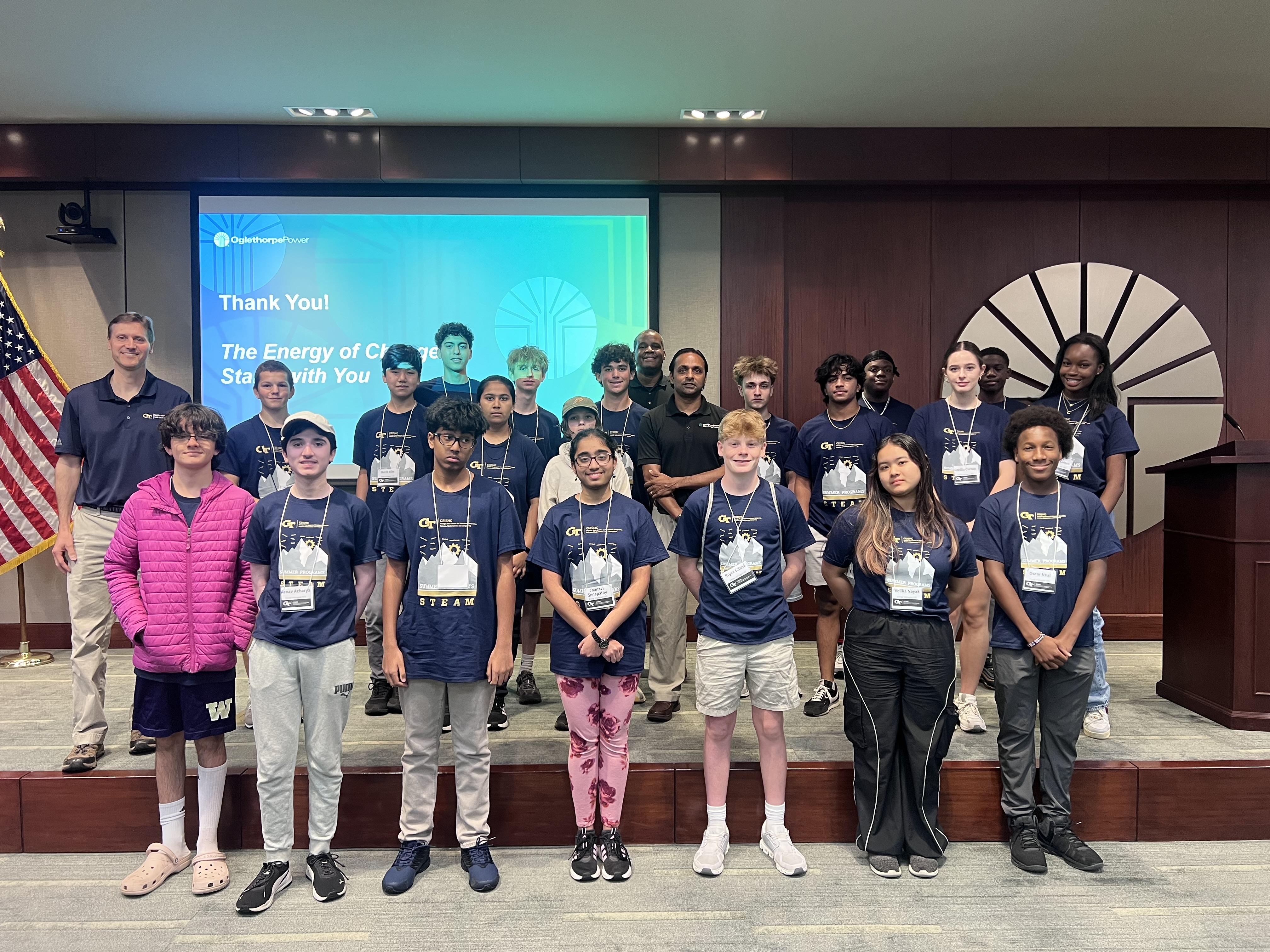
High school students, who participated in the Energy Unplugged Summer Camp at Georgia Tech during a field trip to Oglethorpe Power, Green Power EMC and Georgia Systems Operations Corporation in June 2025.
In June, Georgia Tech’s Strategic Energy Institute (SEI) and the Energy Policy and Innovation Center hosted Energy Unplugged, a weeklong summer camp focused on science, technology, engineering, art, and mathematics (STEAM) for high school students.
Led by SEI’s director of Research and Studies and principal research engineer, Richard Simmons, the camp introduced students to energy fundamentals and highlighted STEAM-related careers and undergraduate pathways valuable in today’s workforce. The curriculum included energy resources, energy production and consumption, conversion and delivery, electric circuits, battery storage, environmental impacts, and data analytics.
As a featured part of this year’s program, students visited the headquarters of Oglethorpe Power, Green Power EMC, and Georgia System Operations Corporation in Tucker, Georgia. The companies are owned by and serve 38 of Georgia’s not-for-profit electric membership cooperatives (EMCs), which provide retail electricity to approximately 4.7 million of Georgia’s more than 11 million residents.
“As electricity demand continues to rise, so does the need to grow a skilled and capable workforce for the future. We are proud to partner with Georgia Tech on this inspiring program, supporting the growth and development of the next generation of leaders who will help power Georgia’s future,” said George Mathai, Oglethorpe Power performance and reliability engineer.
The site visit included a tour of Georgia System Operations’ generation and transmission control centers and presentations by Oglethorpe Power and Green Power EMC experts.
The tour began in the generation control center, where students observed operators continuously monitoring demand to make real-time decisions to increase or decrease electricity generation. Students learned that Georgia System Operations dispatches a wide array of energy sources and generation technologies to ensure a stable, reliable, secure, and efficient power grid.
The group then visited the transmission control center, where a series of massive screens showed the web of transmission lines across the state. Students learned that the transmission system relies on extremely high-voltage lines to minimize loss across long distances. The voltages are then stepped down as they approach population centers at sub-stations, so they are suitable for use by residences, businesses, and industrial facilities. The operators in the transmission center monitor the grid for disturbances and respond to alarms, maintaining the integrity of the state’s power infrastructure.
The tour offered a behind-the-scenes look at how electricity generation and transmission are integrated and managed across the state.
Over lunch, Oglethorpe Power’s George Mathai and Shane Tolbert, Green Power EMC’s distributed energy resources manager, led discussions highlighting the roles of various generation sources and the benefits of a diverse portfolio in balancing cost, reliability, sustainable resources, and environmental impact.
“Learning about how Oglethorpe Power, Green Power EMC, and Georgia System Operations work together was a highlight of the Energy Unplugged camp, as it reinforced many of the tabletop demonstrations and hands-on activities we had conducted in the days leading up to the visit. When students then get a chance to visualize energy production, conversion, and delivery concepts at full scale, lots of light bulbs start clicking on,” Simmons said.
Jointly contributed by:
Oglethorpe Power Corporation
Georgia Tech Strategic Energy Institute (Destin Smyth)
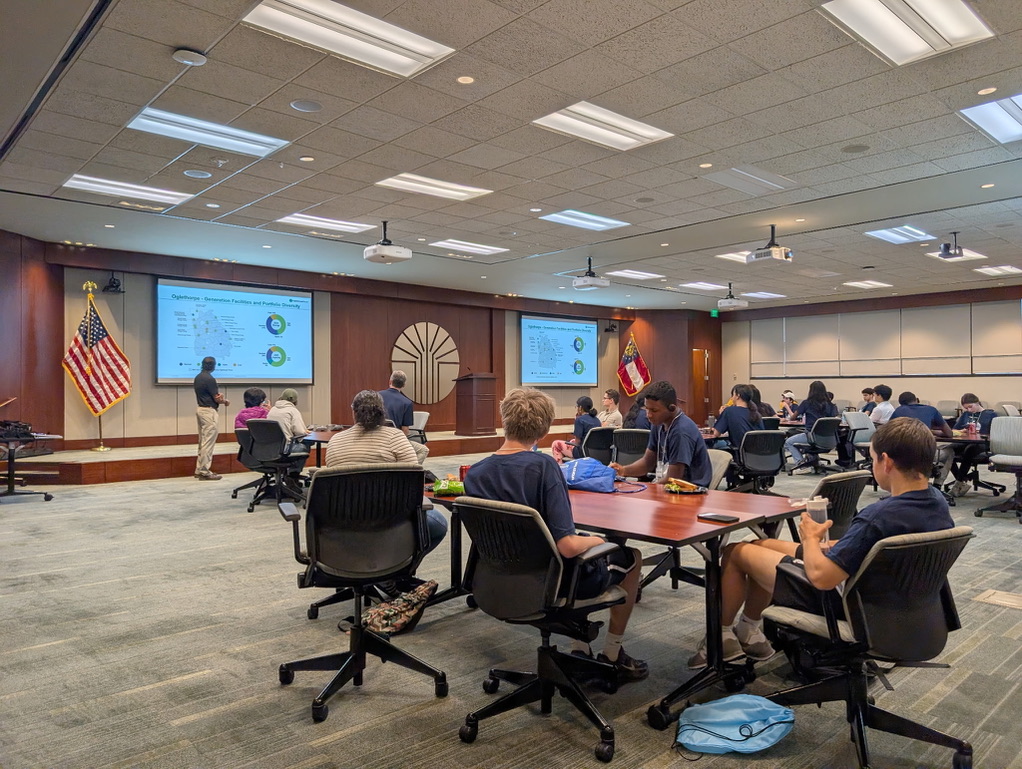
Oglethorpe Power’s George Mathai and Shane Tolbert, Green Power EMC’s distributed energy resources manager, discussing the roles of various generation sources and the benefits of a diverse portfolio with the campers.
Priya Devarajan, Communications Program Manager,
Georgia Tech Strategic Energy Institute
Blair Romero, Director, Corporate Communications
Oglethorpe Power Corporation
‘Biochar’ Can Naturally Clean the Pollution that Rain Washes Off Georgia’s Roads
Jul 10, 2025 — Atlanta, GA
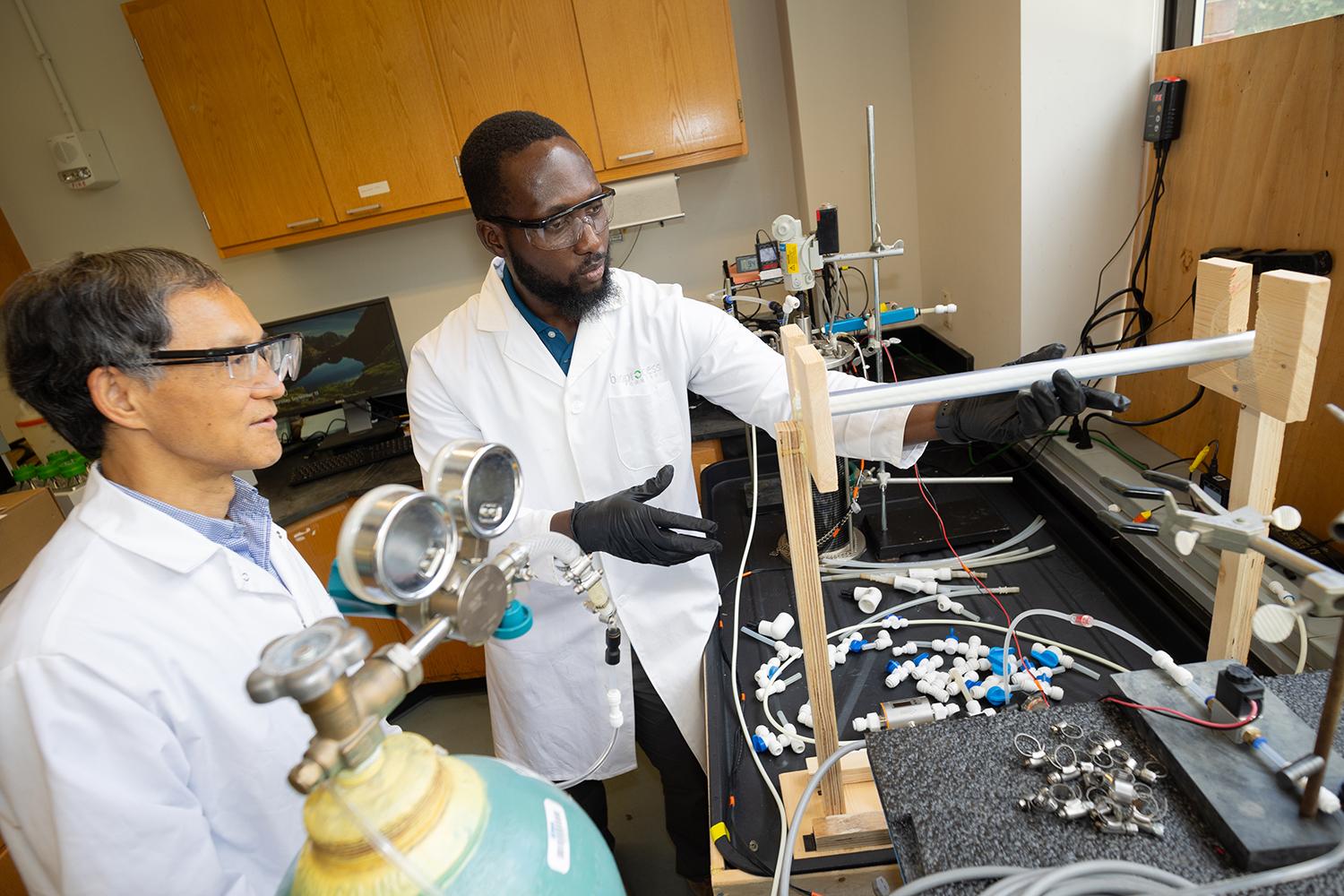
Professor Yongsheng Chen (left) and Ph.D. student Ahmed Yunus work with a wastewater reactor system in the lab. (Photo: Candler Hobbs)
A charcoal-like material made from leaves and branches that collect on forest floors could be a cheap, sustainable way to keep pollution from washing off roadways and into Georgia’s lakes and rivers.
Engineers at Georgia Tech and Georgia Southern University have found that this biological charcoal, or biochar, can be mixed with soil and used along roadways to catch grimy rainwater and filter it naturally before it pollutes surface water.
Their tests found the biochar effectively cleans contaminants from the rainwater and works just as well in the sandy soils of the coastal plain as in the clays of north Georgia. Their biochar-soil mixture can be easily substituted for expensive material mined from the earth that’s typically used on roads.
Though they focused on Georgia, the researchers said the findings could easily apply across the U.S., providing a simple, natural way to keep road pollutants out of water sources. They published their approach in the Journal of Environmental Management.
Learn about their system on the College of Engineering website.
Joshua Stewart
College of Engineering
Study Demonstrates Low-Cost Method to Remove CO₂ from Air Using Cold Temperatures, Common Materials
Jul 07, 2025 — Atlanta, GA
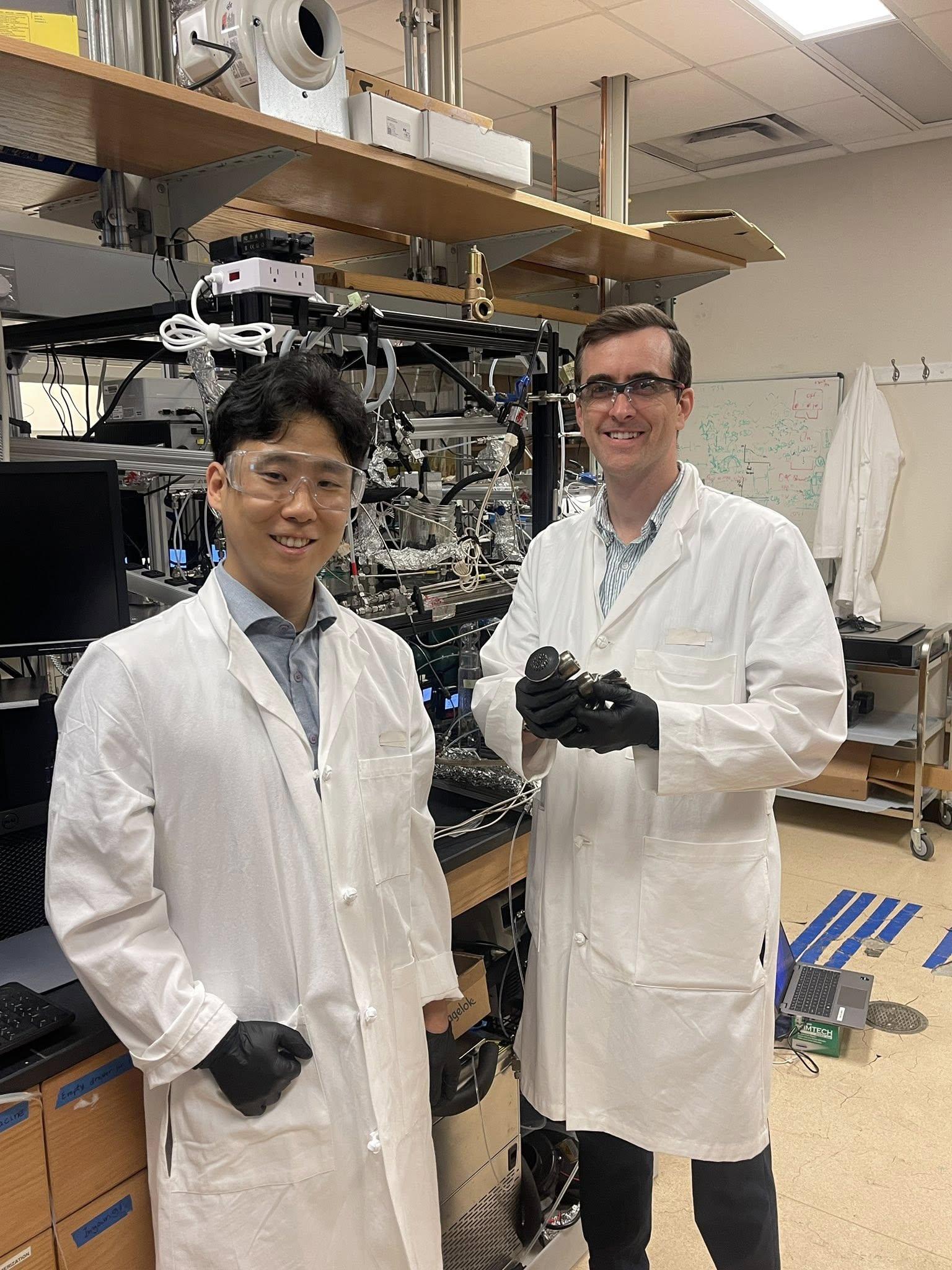
Postdoctoral researcher Seo-Yul Kim and Professor Ryan Lively of Georgia Tech's School of Chemical and Biomolecular Engineering
Researchers at Georgia Tech’s School of Chemical and Biomolecular Engineering (ChBE) have developed a promising approach for removing carbon dioxide (CO₂) from the atmosphere to help mitigate global warming.
While promising technologies for direct air capture (DAC) have emerged over the past decade, high capital and energy costs have hindered DAC implementation.
However, in a new study published in Energy & Environmental Science, the research team demonstrated techniques for capturing CO₂ more efficiently and affordably using extremely cold air and widely available porous sorbent materials, expanding future deployment opportunities for DAC.
Harnessing Already Available Energy
The research team – including members from Oak Ridge National Laboratory in Tennessee and Jeonbuk National University and Chonnam National University in South Korea – employed a method combining DAC with the regasification of liquefied natural gas (LNG), a common industrial process that produces extremely cold temperatures.
LNG, which is a natural gas cooled into a liquid for shipping, must be warmed back into a gas before use. That warming process often uses seawater as the source of the heat and essentially wastes the low temperature energy embodied in the liquified natural gas.
Instead, by using the cold energy from LNG to chill the air, Georgia Tech researchers created a superior environment for capturing CO₂ using materials known as “physisorbents,” which are porous solids that soak up gases.
Most DAC systems in use today employ amine-based materials that chemically bind CO2 from the air, but they offer relatively limited pore space for capture, degrade over time, and require substantial energy to operate effectively. Physisorbents, however, offer longer lifespans and faster CO₂ uptake but often struggle in warm, humid conditions.
The research study showed that when air is cooled to near-cryogenic temperatures for DAC, almost all of the water vapor condenses out of the air. This enables physisorbents to achieve higher CO₂ capture performance without the need for expensive water-removal steps.
“This is an exciting step forward,” said Professor Ryan Lively of ChBE@GT. “We’re showing that you can capture carbon at low costs using existing infrastructure and safe, low-cost materials.”
Cost and Energy Savings
The economic modeling conducted by Lively’s team suggests that integrating this LNG-based approach into DAC could reduce the cost of capturing one metric ton of CO₂ to as low as $70, approximately a threefold decrease from current DAC methods, which often exceed $200 per ton.
Through simulations and experiments, the team identified Zeolite 13X and CALF-20 as leading physisorbents for this DAC process. Zeolite 13X is an inexpensive and durable desiccant material used in water treatment, while CALF-20 is a metal-organic framework (MOF) known for its stability and CO2 capture performance from flue gas, but not from air.
These materials showed strong CO₂ adsorption at -78°C (a representative temperature for the LNG-DAC system) with capacities approximately three times higher than those found in amine materials that operate at ambient conditions. They also released the captured and purified CO₂ with low energy input, making them attractive for practical use.
“Beyond their high CO2 capacities, both physisorbents exhibit critical characteristics such as low desorption enthalpy, cost efficiency, scalability, and long-term stability, all of which are essential for real-world applications,” said lead author Seo-Yul Kim, a postdoctoral researcher in the Lively Lab.
Leveraging Existing Infrastructure
The study also addresses a key concern for DAC: location. Traditional systems are often best suited for dry, cool environments. But by leveraging existing LNG infrastructure, near-cryogenic DAC could be deployed in temperate and even humid coastal regions, greatly expanding the geographic scope of carbon removal.
“LNG regasification systems are currently an untapped source of cold energy, with terminals operating at a large scale in coastal areas around the world,” Lively said. “By harnessing even just a portion of their cold energy, we could potentially capture over 100 million metric tons of CO₂ per year by 2050.”
As governments and industries face increasing pressure to meet net-zero emissions goals, solutions like LNG-coupled near-cryogenic DAC offer a promising path forward. The next steps for the team include continued refinement of materials and system designs to ensure performance and durability at larger scales.
“This is an exciting example of how rethinking energy flows in our existing infrastructure can lead to low-cost reductions in carbon footprint,” Lively said.
The study also demonstrated that an expanded range of materials could be employed for DAC. While only a small subset of materials can be used at ambient temperatures, the number that are viable grows substantially at near-cryogenic temperatures.
“Many physisorbents that were previously dismissed for DAC suddenly become viable when you drop the temperature,” said Professor Matthew Realff, co-author of the study and professor at ChBE@GT. “This unlocks a whole new design space for carbon capture materials.”
Citation: Seo-Yul Kim, Akriti Sarswat, Sunghyun Cho, MinGyu Song, Jinsu Kim, Matthew J. Realff, David S. Sholl, and Ryan P. Lively, “Near-Cryogenic Direct Air Capture using Adsorbents,” Energy & Environmental Science, 2025.
Brad Dixon, braddixon@gatech.edu
ATL CleanTech Connect Summer Spotlight - July 16, 2025
Join us at the next ATL CleanTech Connect on July 16th for an energizing conversation on cleantech innovation, insight, and impact! This special edition will feature:
Spotlight on Energy-Water Technology Nexus: Hear from WattAir’s Joseph Mooney on how smart, connected technologies from leading-edge startups are transforming the energy landscape.
Partnership for Inclusive Innovation Kicks Off Record Summer Internship
Jun 24, 2025 — WARNER ROBINS, Ga.
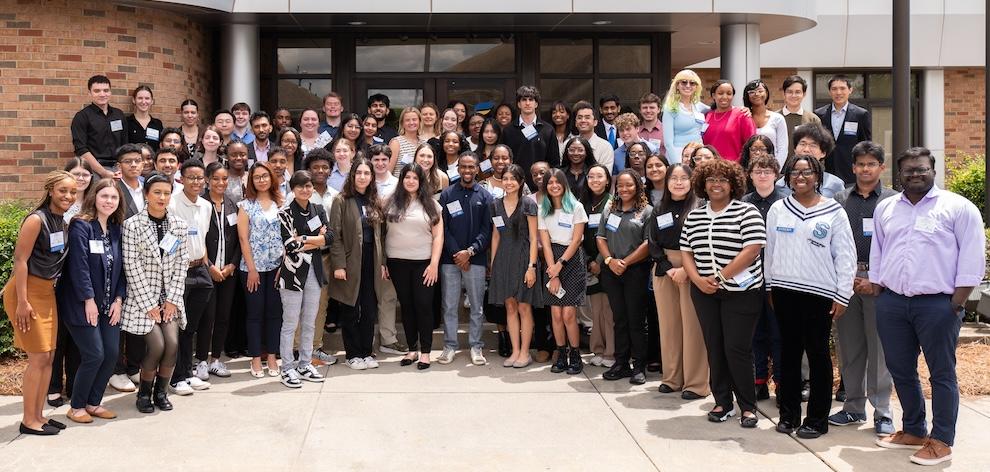
The PIN Summer Interns at the opening ceremony
The Partnership for Inclusive Innovation launched the sixth annual PIN Summer Intern (PSI) program in May with an event at Fort Valley State University’s location in Warner Robins, Georgia. The program is shaping up to be the biggest yet.
This summer, 103 students are working on 51 projects across 27 communities in Georgia, Alabama, Virginia, and Texas. Selected from nearly 700 applicants — a 73% increase over last year — these students are tackling real-world challenges ranging from AI applications in North Georgia to Native American initiatives in Whigham, Georgia, and Bracketville, Texas.
By pairing students from different years, majors and institutions, the PSI program gives the next generation of innovators hands-on experience addressing complex challenges while delivering practical solutions to communities across the region.
A collaboration with the Southeast Crescent Regional Commission (SCRC) has funded 17 projects in several counties in Middle and South Georgia and is a large part of the program’s expansion this year. The opportunity to make an impact across a broad swath of Georgia is part of why the SCRC was interested in working with PIN, said SCRC Executive Director Christopher McKinney.
Karen Kirkpatrick (karen.kirkpatrick@innovate.gatech.edu)
Fan Zhang Receives National Engineering Achievement Award from ANS
Jun 24, 2025 — Atlanta, GA
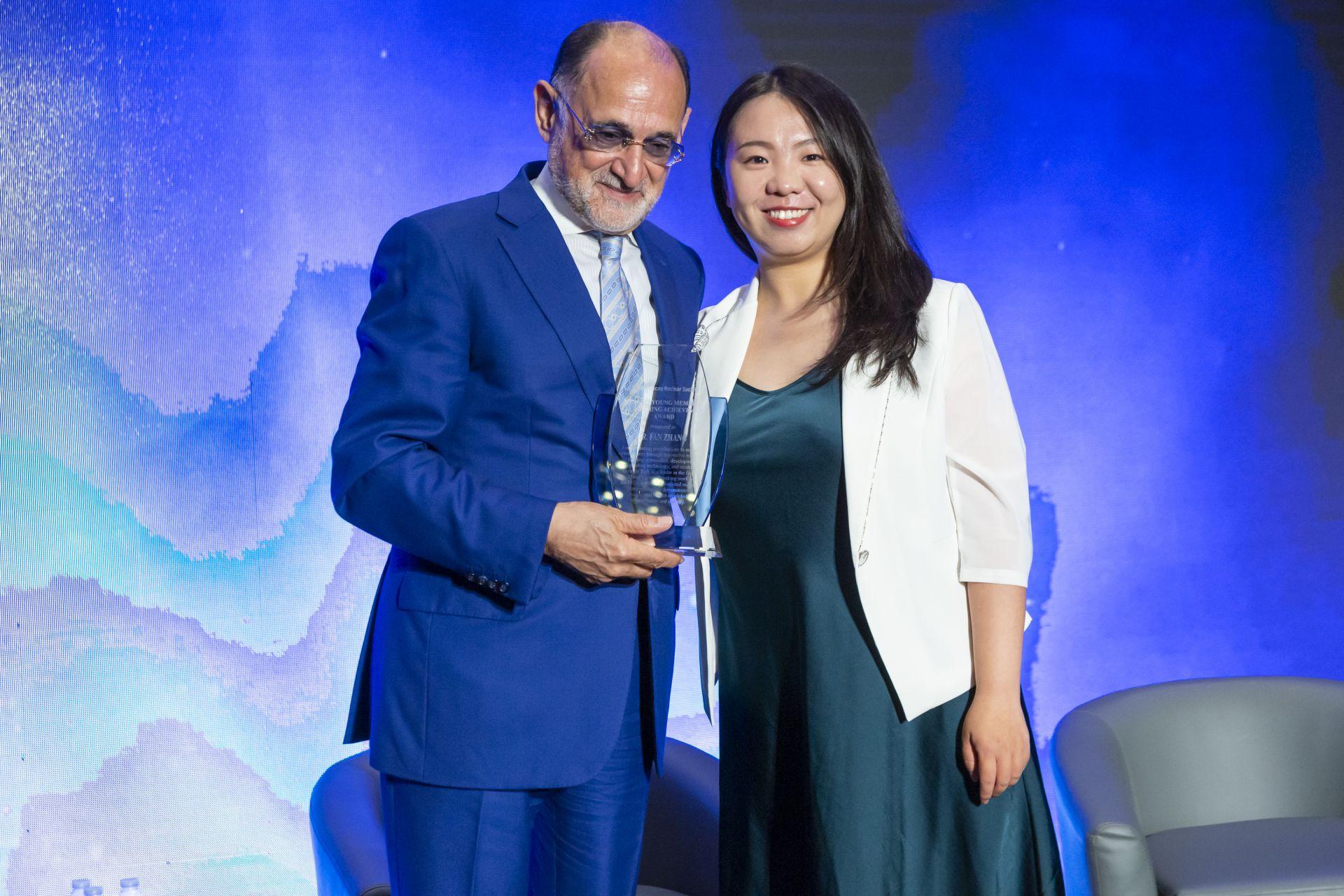
Fan Zhang, Assistant Professor of Mechanical Engineering at Georgia Tech Receives National Engineering Achievement Award from ANS.
Fan Zhang, assistant professor in the George W. Woodruff School of Mechanical Engineering, has received the 2025 Landis Young Member Engineering Achievement Award from the American Nuclear Society (ANS).
The award recognizes young members for outstanding achievements in which engineering knowledge is effectively applied to yield an engineering concept, design, safety improvement, method of analysis, or product utilized in nuclear power research and development or commercial application.
Zhang was selected by the ANS Honors and Awards Committee for her pioneering contributions to nuclear cybersecurity through innovative machine learning (ML) approaches, development of patent-pending technology, and efforts to establish Georgia Tech as a leader in the field. The award also recognizes her collaboration with the International Atomic Energy Agency and her groundbreaking research on robot-assisted nuclear power plant monitoring, which improves safety and efficiency and demonstrates exceptional impact on global nuclear security.
Zhang serves as the director of the Intelligence for Advanced Nuclear (iFAN) Lab at Georgia Tech. Her research primarily focuses on nuclear cybersecurity, online monitoring, fault detection, digital twins, AI/ML, and robotics. Her work on robot-assisted nuclear power plant monitoring, which combines these cross-cutting areas, could significantly reduce human worker presence in harsh and potentially hazardous environments and improve the efficiency of plant operation. The work was supported by the inaugural Department of Energy Office of Nuclear Energy Distinguished Early Career Award.
Georgia Tech Launches Two New Interdisciplinary Research Institutes
Jul 01, 2025 — Atlanta, GA

Georgia Tech has launched two new Interdisciplinary Research Institutes (IRIs): The Institute for Neuroscience, Neurotechnology, and Society (INNS) and the Space Research Institute (SRI).
The new institutes focus on expanding breakthroughs in neuroscience and space, two areas where research and federal funding are anticipated to remain strong. Both fields are poised to influence research in everything from healthcare and ethics to exploration and innovation. This expansion of Georgia Tech’s research enterprise represents the Institute’s commitment to research that will shape the future.
“At Georgia Tech, innovation flourishes where disciplines converge. With the launch of the Space Research Institute and the Institute for Neuroscience, Neurotechnology, and Society, we’re uniting experts across fields to take on some of humanity’s most profound questions. Even as we are tightening our belts in anticipation of potential federal R&D budget actions, we also are investing in areas where non-federal funding sources will grow and where big impacts are possible,” said Executive Vice President for Research Tim Lieuwen. "These institutes are about advancing knowledge — and using it to improve lives, inspire future generations, and help shape a better future for us all.”
Both INNS and SRI grew out of faculty-led initiatives shaped by a strategic planning process and campus-wide collaboration. Their evolution into formal institutes underscores the strength and momentum of Georgia Tech’s interdisciplinary research enterprise.
Georgia Tech’s 11 IRIs support collaboration between researchers and students across the Institute’s seven colleges, the Georgia Tech Research Institute (GTRI), national laboratories, and corporate entities to tackle critical topics of strategic significance for the Institute as well as for local, state, national, and international communities.
"IRIs bring together Georgia Tech researchers making them more competitive and successful in solving research challenges, especially across disciplinary boundaries,” said Julia Kubanek, vice president of interdisciplinary research. “We're making these new investments in neuro- and space-related fields to publicly showcase impactful discoveries and developments led by Georgia Tech faculty, attract new partners and collaborators, and pursue alternative funding strategies at a time of federal funding uncertainty."
The Space Research Institute
The Space Research Institute will connect faculty, students, and staff who share a passion for space exploration and discovery. They will investigate a wide variety of space-related topics, exploring how space influences and intersects with the human experience. The SRI fosters a collaborative community including scientific, engineering, cultural, and commercial research that pursues broadly integrated, innovative projects.
SRI is the hub for all things space-related at Georgia Tech. It connects the Institute’s schools, colleges, research institutes, and labs to lead conversations about space in the state of Georgia and the world. Working in partnership with academics, business partners, philanthropists, students, and governments, Georgia Tech is committed to staying at the forefront of space-related innovation.
The SRI will build upon the collaborative work of the Space Research Initiative, the first step in formalizing Georgia Tech’s broad interdisciplinary space research community. The Initiative brought together researchers from across campus and was guided by input from Georgia Tech stakeholders and external partners. It was led by an executive committee including Glenn Lightsey, John W. Young Chair Professor in the Daniel Guggenheim School of Aerospace Engineering; Mariel Borowitz, associate professor in the Sam Nunn School of International Affairs; and Jennifer Glass, associate professor in the School of Earth and Atmospheric Sciences. Beginning July 1, W. Jud Ready, a principal research engineer in GTRI’s Electro-Optical Systems Laboratory, will serve as the inaugural executive director of the Space Research Institute.
To receive the latest updates on space research and innovation at Georgia Tech, join the SRI mailing list.
The Institute for Neuroscience, Neurotechnology, and Society
The Institute for Neuroscience, Neurotechnology, and Society (INNS) is dedicated to advancing neuroscience and neurotechnology to improve society through discovery, innovation, and engagement. INNS brings together researchers from neuroscience, engineering, computing, ethics, public policy, and the humanities to explore the brain and nervous system while addressing the societal and ethical dimensions of neuro-related research.
INNS builds on a foundation established over a decade ago, which first led to the GT-Neuro Initiative and later evolved into the Neuro Next Initiative. Over the past two years, this effort has culminated in the development of a comprehensive plan for an IRI, guided by an executive committee composed of faculty and staff from across Georgia Tech. The committee included Simon Sponberg, Dunn Family Associate Professor in the School of Physics and the School of Biological Sciences; Christopher Rozell, Julian T. Hightower Chaired Professor in the School of Electrical and Computer Engineering; Jennifer Singh, associate professor in the School of History and Sociology; and Sarah Peterson, Neuro Next Initiative program manager. Their leadership shaped the vision for a research community both scientifically ambitious and socially responsive.
INNS will serve as a dynamic hub for interdisciplinary collaboration across the full spectrum of brain-related research — from biological foundations to behavior and cognition, and from fundamental research to medical innovations that advance human flourishing. Research areas will encompass the foundations of human intelligence and movement, bio-inspired design and neurotechnology development, and the ethical dimensions of a neuro-connected future.
By integrating technical innovation with human-centered inquiry, INNS is committed to ensuring that advances in neuroscience and neurotechnology are developed and applied ethically and responsibly. Through fostering innovation, cultivating interdisciplinary expertise, and engaging with the public, the institute seeks to shape a future where advancements in neuroscience and neurotechnology serve the greater good. INNS also aims to deepen Georgia Tech’s collaborations with clinical, academic, and industry partners, creating new pathways for translational research and real-world impact.
An internal search for INNS’s inaugural executive director is in the final stages, with an announcement expected soon.
Join our mailing list to receive the latest updates on everything neuro at Georgia Tech.
Laurie Haigh
Research Communications
Tim Lieuwen Receives ASME Medal, the Society’s Highest Honor
Jun 30, 2025 — Atlanta, GA

The American Society of Mechanical Engineers (ASME) is recognizing Georgia Tech alumnus and faculty member Tim Lieuwen with its most distinguished award: the ASME Medal.
He is the first person from Georgia Tech to receive the medal in its 105-year history. The honor is reserved for “eminently distinguished engineering achievement” — in Lieuwen’s case, for leadership in promoting clean energy and sustainable propulsion systems. He’s also being recognized for his contributions to policy and workforce development.
“I’m deeply honored to receive this award — and even more grateful for the extraordinary community that made it possible,” said Lieuwen, Tech’s executive vice president for Research and Regents’ Professor in the Daniel Guggenheim School of Aerospace Engineering. “For three decades at Georgia Tech, I’ve been privileged to work alongside brilliant colleagues, students, and staff who shaped my journey and driven our shared success. This recognition isn’t mine alone; it belongs to every member of our Yellow Jacket family who turns bold ideas into real-world results. It’s a celebration of what we’ve accomplished together — and a powerful reminder of the exciting path ahead.”
Read more about the award from the Daniel Guggenheim School of Aerospace Engineering.
Joshua Stewart
College of Engineering
